
Vol. 1, No. 35 Published by India China Division, Air Transport Command September 13, 1945

|
Reoccupation of Far East Gets Underway as Chinese Forces Are Flown in by ICD American 10th AF Lifts Soldiers to Nanking for Occupation Hq., Calcutta - The vanguard of 28,000 Chinese troops are in Shanghai today as ICD's movement of an entire army continues at full speed. As soon as the green light was given for the hitherto secret prospect - aircraft began pouring troops into the Eastern China metropolis which has surrendered three days before. Bengal-Based Aircraft The Chinese troops, composing three divisions of the 94th Chinese army, are being rushed to the seaport city to take over important areas evacuated by the Japs. C-54 aircraft based at Kurmitola/Tezgaon are bearing the bulk of the burden in airlifting the troops from Liuchow to Shanghai. Taking off from their Bengal bases the C-54's carry a full load of gasoline in their tanks and cargo compartments for refueling on the return trip. At Liuchow, the fuel cargo is off-loaded and Chinese troops are taken aboard for the flight to Shanghai. On the return flight, after delivering the troops at Shanghai, the C-54's stop at Liuchow for refueling from the gasoline they carried on their east-bound flight, before continuing the return trip. The first regular flights into Shanghai were made by five-man crews in order to include a navigator. Later, as the 918-mile route from Liuchow to Shanghai became better known, the crew was reduced to four. The distance from East Bengal bases to Shanghai is 2,148 miles. Opening the project was the survey flight of Lt. Col. Charles H. Blanchard, division flight operations officer, senior officer in charge of the first ATC aircraft to land in Shanghai, September 3. He returned to Liuchow the same day. The next morning, he returned to Shanghai with a C-47 equipped to serve as a control tower, and to operate a homing device for incoming planes. On the morning of September 5, the C-54's carrying the Chinese troops began to arrive. Seventy aircraft, carrying fully-equipped troops, arrived by nightfall. The field remained in Jap hands and, although the ICD forces lacked transportation, engineering, communications and messing facilities, the project proceeded with clock-like dispatch. Pilots, arriving at the field, saw scores of enemy aircraft and virtually rubbed elbows with the Jap guards patrolling the areas; yet no incident occurred to mar the American operations at the field. The diversion of C-54s from the Hump to accomplish the Liuchow-Shanghai move necessitated comprehensive, long-range logistical planning. The delivery of fuel for China missions, and other important commitments such as flying in sustenance for the American forces, and the air evacuation of prisoners of war, continued uninterrupted despite the heavy drain on operational facilities by the Shanghai project. Co-ordinated with the Liuchow-Shanghai movement, is the transport of the Chinese 6th Army from Chihkiang to Nanking by troop carrier and combat cargo transports of the 10th Air Force under direction of the AAF in China. |
|
Far East POWs Air-Evacuated By Division Within ten days after the signing of the Japanese surrender terms, approximately 1,000 prisoners-of-war had been evacuated by air from Jap prison camps throughout the Far East. In one of the largest aerial evacuations of the war, ICD aircraft, staffed with surgeons, flight nurses and medical supplies, flew out POWs from Rangoon, Burma; Bangkok and Saigon, Thailand; from Singapore, Indo-China and Northern China. Welcome Doubtful First priority was given this mission in order that American soldiers and sailors and interned civilians - some of whom had been held captive for almost four years - could receive proper medical attention at the earliest moment. Urgency of the mission sent pilots, doctors and nurses into Japanese airfields where reception was more than a little doubtful. The survey flight which led the way into Singapore was the first AAF aircraft to land at that city after cessation of hostilities. In other sections, the evacuation planes were close behind the first American forces, which arrived to round up the prisoners of war and to prepare for their removal to assembly points. Japs Subdued Because of the uncertainty of the situation, the first survey flights maintained radio contact with their headquarters bases every 15 minutes. Plans made in advance of the surrender contributed to the speed with which the interned were brought out. Division aircraft were assembled at staging areas in India, China and Burma, prior to the signing of the surrender terms in the various military areas. Crews were briefed and waiting for the proposed missions. Pilots reported a subdued, respectful reception from the Jap guards at most of the fields. The first American prisoners met also were not demonstrative until they began to realize the import of the transports waiting on the fields. |
Every GI A 'Dream Man' In
Shanghai, Oriental Utopia
Shanghai - What you've heard about Shanghai is true. Every bit of it. You probably wouldn't believe it even if you saw it. But it's true.
Yanks arriving at the airport here get a slight taste of what's in store for them when they're greeted by cheering, screaming throngs of Chinese.
Autograph Hunters
They begin to expect great things when GIs at the field make remarks such as, "You ain't seen nuthin'." Wait'll ya hit town. Why you'd think ya were Clark Gable or someone ..."
When well-dressed, prosperous-looking Chinese, young and old, start to pester you for autographs, you get an inkling about how these people feel about the Yanks who are bringing their soldiers back to occupy Shanghai.
New York of the Orient
All around town Japanese soldiers were standing guard or racing around on motorcycles and in classy cars, but it's the GI in a truck or jeep who really rates. Day after day the celebration goes on. Streets are lined with Chinese. Entrances to hotels have to be roped off to prevent the Yanks from losing their shirts to over-eager backpatting Shanghai residents.
It takes a couple of days for all this to soak into the cranium of the guy who brought a sleeping bag and loaded his duffle bag with K-rations, beer and toilet paper. He staggers from the shock when he walks into the lobby of the Park Hotel in the heart of the International Settlement and takes a gander at the beautiful modern appointments.
Millionaires?
Then, like a flash, it begins to dawn on one that this really is the New York of the Orient.
If the GI in the rumpled uniform, the crushed cap and the dusty shoes needed any proof that he's suddenly been thrust into a city gone mad, he gets it when he slides an American buck across the counter and gets from 90,000 to 100,000 CRB (China Reserve Bank) dollars. For a Stateside ten-spot he becomes a millionaire. His head reels as he buys a meal costing anywhere from 150,000 to 200,000 dollars.
And Gals
For long, bitter years the Chinese have been hoarding the best of everything. Now it's flowing in the streets - and out of Yanks' ears. Scotch? Plenty. Fancy ice cream sundaes and sodas? Like nothing you've ever seen before. Fresh milk? All you can drink - and good, too. Hotel accommodations? Strictly Stateside. Gals? Brother, if you haven't a stout club for protection, don't come to Shanghai! They've been waiting for you since 1941 - these White Russians, German-Jewish refugees, Poles, Hungarians, French women and a host of other cosmopolites.
Right now - five days after the first khaki-clad Yanks slipped into town - the firecrackers are still exploding in the streets. The cheers are still going up. The victory signs, red and white and blue, are glittering. The horns are honking. The people are still gaping at each American who enters or leaves a building.
Confusion Rampant
GIs, as well as officers, have been living in the best hotels in town. Only yesterday the Japs were cleared out of the YMCA building, which the air forces took over for billeting and offices.
Confusion is rampant, and everybody loves it. No one knows exactly what is going on - or even what is supposed to. But everybody is determined not to miss the fun until he finds out.
The story is different out at the airport where the planes come and go and crews and perspiring ground workers sweat 'em in and out during daylight hours. But at night what they do is their own business. At the moment there are no night landing facilities. And it's an odds-on bet that the guys working at the airdrome aren't eager that they be developed.
Japs Ignored
Stores are modern. Streets are clean. Eating and drinking places are abundant. The populace is not only cordial but frenzied. For what more can a guy stationed in the outposts of China or India for a dozen or two dozen months ask?
Officials are still waiting to take over the city after the surrender here is signed. Until then the Japs run the city - from an academic standpoint. But actually, the handful of Americans here are the hub around which this dizzy city is spinning so merrily. Official victory or no, the Chinese have had their fill of the oppressive little men in their funny-looking caps. So they're cheering the Yanks and ignoring the Japs.
Nope, this ain't the Army. But it sure as hell is Shanghai!
Tojo Makes Suicide Attempt Following Gen. Mac's Decree
Announcement by Gen. MacArthur of a series of decrees to the Japanese government drew a variety of reactions.
In Tokyo, Warlord Tojo, who ordered the attack on Pearl Harbor, attempted to commit suicide when American troops arrived to arrest him. Once arrested, he said he felt - "sorry." He was given a 50-50 chance to live.
The people in general, took the occupation rather calmly, as thousands of Americans poured into Tokyo. Gen. MacArthur was quoted as saying that the Japanese apparently were making every effort to carry out the surrender agreements.
MacArthur had earlier ordered the abolishment of the Japanese Imperial headquarters, suspended shortwave broadcasts to the outside world and thrown a tight censorship over Tokyo news channels, according to Army News Service.
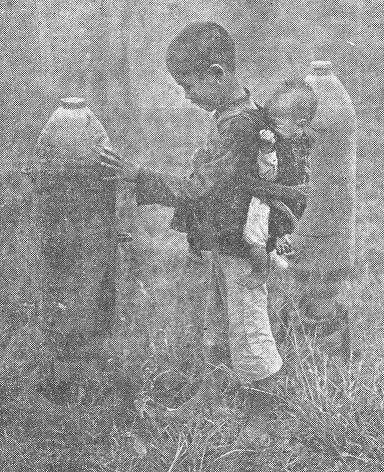 Nanning, China - The war and its end are a long way from the minds of these youngsters, but the effects of it show on their tattered
clothing and the baby that lacks it's mothers care.
During eight years of bombing these have become familiar sights.
Nanning, China - The war and its end are a long way from the minds of these youngsters, but the effects of it show on their tattered
clothing and the baby that lacks it's mothers care.
During eight years of bombing these have become familiar sights.
|
'Mixologist' Finds Vodka Has
Mighty Kick - in the Teeth
1350 BU, Kunming - It has long been a recognized fact that "Joe's" Russian vodka packs a wallop. S/Sgt. John W. Ryan, Boston, Mass., now will tell you that it also contains a formidable kick - in the teeth, to be specific.
Sgt. Ryan, who claims to have split the atom in Joe's vodka, is not ordinarily a drinking man. In fact, it was only concern over his health that led to this startling discovery. Always anxious to supplement the messhall diet, he enthusiastically accepted a can of lemon extract from an undisclosed mess sergeant. The extract, he was told, contained a large amount of vitamin C - just what he needed!
The extract was duly mixed with five parts of water, to which ten parts of Joe's Russian Vodka had been added for flavor, and a group of four stalwart subscribers of Health Magazine sat down to drink the mixture of concentrated vitamins.
After about an hour, just when the GIs were beginning to feel the effects of the drink, Ryan suddenly turned pale. He looked at the bottom of the glass - there were four little white objects. He looked in the mirror, and his suspicions were confirmed. Four fillings had been removed by the potent liquid!
Hungry GIs Mourn, Sergeant Writes Play
As Party Is Canceled
1306 BU, Karachi - A recent attempt to throw a party similar to the "shindigs we used to have back in Pittsburgh" has resulted in one very frustrated sergeant and a bevy of still-hungry GIs.
When a civilian friend of Sgt. Pete Barry suggested that the GI invite a "few friends" and have a party at his home, Sgt. Barry enthusiastically set about making arrangements. Musicians, bartenders, waiters, chefs, food and "refreshments" were all ready when Barry handed the guest list to his friend - three pages of type-written names.
One look at that list and the GIs acquaintance suddenly remembered that his wife had a terrible headache. Now Sgt. Barry is spending his spare time writing a play, "The Men Who Didn't Come to Dinner."
Army Announces Scores Needed for Officers' Exit
Washington (ANS) - The War Department has unveiled its point discharge system for army officers and estimated that about 25 percent of the 800,000 in the army would be eligible for discharge under it.
Scores based on service, combat and parenthood credits compiled up to September 2 ranged from 41 for some ranks to 100 for others. The War Department said they would be lowered occasionally so that about 600,000 officers would be released by next July. Surplus officers for whom no suitable assignments can be found will be released regardless of whether they have the required points.
The breakdown is: colonel and major, 100; captain, first lieutenant and second lieutenant, 85; warrant officer and flight officer 80; nurses 65; WAC officers 44; physical therapists and dieticians, 41. Some specialists will be retained, but not for more than six months.
All Two-Year Men Out by Sept. 1, 1946
Washington (ANS) - The Army plans to demobilize all men with two years' service, between now and Sept. 1, 1946, Chairman Andrew May of the house military committee reported. May added that the War Department as yet has made no definite commitment on such a program, but that it hopes to release two-year men as soon as possible.
His statement came as Sen. Edwin C. Johnson (D., Colo.) asserted the army "brass hats" want voluntary recruiting to fall "because they love the draft." He urged repeal of the draft law and said congress must act at once to speed service releases.
Initial Flight To Singapore Made by C-54
POW Camp Described As Place of 'Filth, Disease'
Hq., Calcutta - The first AAF plane to land at Singapore following the surrender of that naval base was an ICD C-54, the first of three dispatched to that city from Calcutta on POW missions.
The plane circled three airfields near the city before risking a landing without contact with ground forces. Radio facilities were inoperative at the time.
The flight to Singapore, a 2,000-mile journey largely over ocean, was made without aid of weather reports the last 1,500 miles. The plane was serviced with enough gasoline to reach Singapore and continue to an alternative airport in the direction of Calcutta in case a landing could not be made there.
Radio contact with Calcutta was maintained throughout the flight, with a report made every 15 minutes. Since there was no accurate information available at takeoff, there was considerable uncertainty concerning what might be met during the flight, as well as the reception to be expected at the Jap-held airfield in Singapore and its vicinity.
Maj. Edward A. Schackel, medical technician and one of the crew members, said that the Swiss consul in Singapore drove the crew to the POW camp, 15 miles from the field. Many Jap soldiers, he stated, saluted them with respect.
"They seemed very humble," he said.
|
The POW camp was described by Maj. Schackel as a place of "lice and filth and disease." The consul, he said, stated that the camp was designed to house 600 prisoners - 12,000 persons were crowded within its confines.
In the camp were 91 American military POWs and 22 American civilians. The first C-54 brought out 40 POWs, including all the hospital cases, and left emergency supplies for the others. The remainder were flown out by later flights.
Members of the crew, other than Maj. Schackel, were: Maj. Lorris W. Moomaw and Capt. Joseph F. Chuse, pilots; 1st Lt. Bobby M. Burns, co-pilot; 1st Lt. Jack I. Portner, navigator; Capt. B. K. Byrne, flight surgeon; Pfc. Robert C. Hilton, radio operator; Pfc. Jack D. Seratt, aerial engineer, and S/Sgt. Alexander George, Jr. and Pfc. Louis D. Nelson, crew members.
|
|
|
|
|
|
Lt. is Honor Guest on Singapore Flight
1304 BU, Barrackpore, India - Add to the O'Henry twist of strange meetings in the Orient, the case of Capt. Joseph E. O'Dwyer, chief pilot at the Barrackpore air base, in Singapore recently.
Captain O'Dwyer, whose home is in Huntington, W. Va., was the pilot on a C-54 which arrived in Singapore to remove prisoners-of-war. In the temporary operations office he recognized a former schoolmate standing among a group of POWs. The friend, 1st Lt. Don Smith, a B-24 pilot, had been shot down two years earlier over French Indo-China.
The ICD pilot said he had not seen his friend for five years. Lt. Smith rode back to Calcutta in Capt. O'Dwyer's ship as the guest of honor.
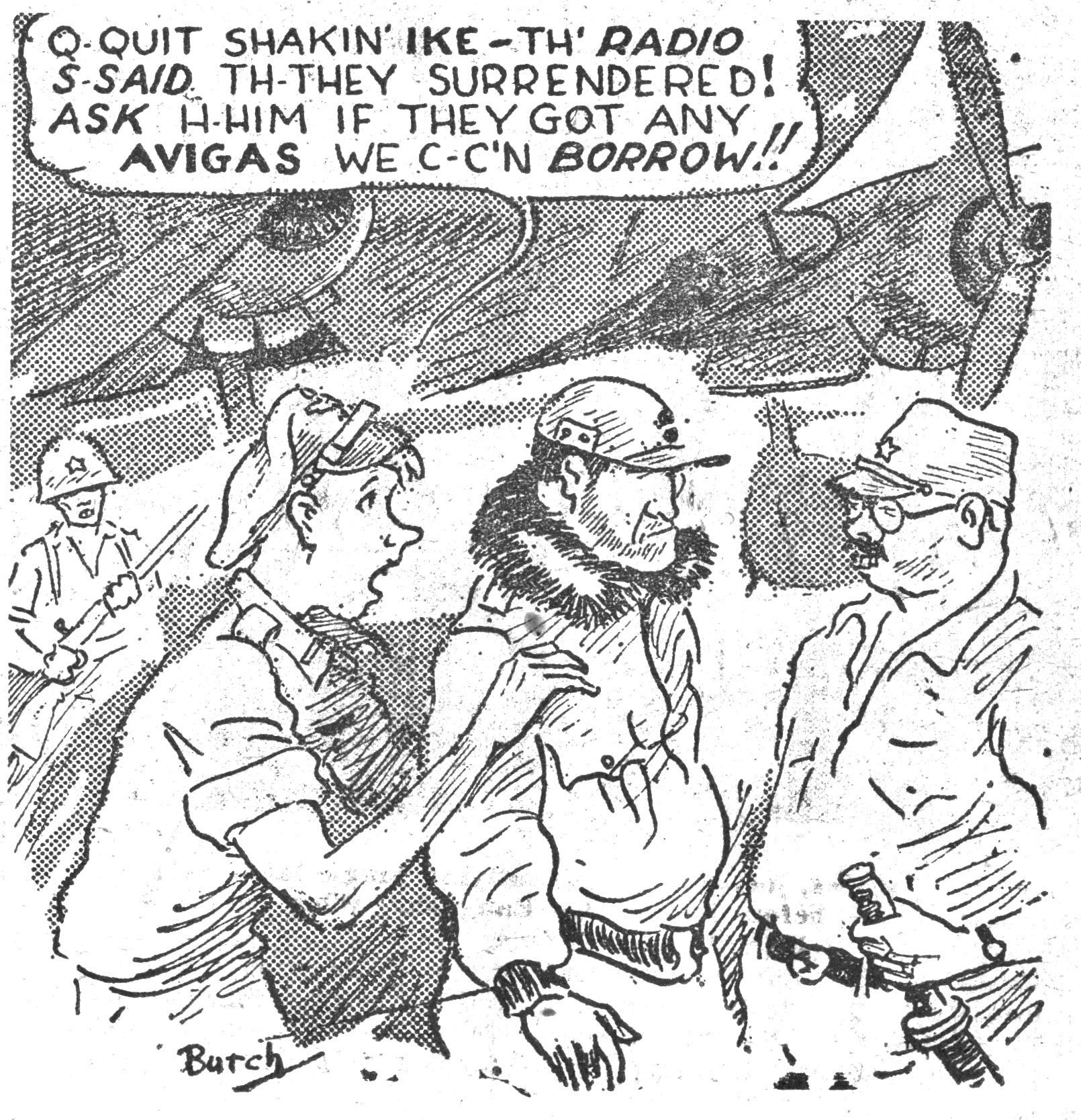
|

Censors
We've had a lot of trouble with censors - press censors, those guys who blue-pencil copy which goes into the Express. Anyone who publishes an army newspaper would have trouble with them.
Now that the war is over and most press censorship stops have been lifted, we can say something we have had on our chest a long time ... something we wouldn't have dared to say when censorship was still on ...
We have found press censors to be a pretty good bunch of sincere, level-headed, conscientious fellows. Sure, we've had some pretty hot arguments when we wanted to get copy into the paper and they wanted to keep it out - when it got down to a matter of interpreting censorship stops and whether they applied or whether they didn't.
But - looking back over the many times we've sweated it out in the censors office - we are the first to admit they were doing their best to be more than fair all the way around - even to stretching a point once in a while. We also realize they had a vast amount of regulations to comply with - with which they had no alternative but to comply - as silly as some were.
So - to the press censor of Calcutta, who have censored, and we mean censored, the majority of the Express's copy these many months - now that the battle is over - we say "Teek Hai," and to his contemporary over in China who has wielded the big stick on that side - "Ding Hao!"
(Of course, if anything comes up in the waning days ahead in which we fall again into one of those desk-pounding sessions over some unforeseen argument like those of old, this editorial doesn't count - while the argument lasts, at least.)
However, we do want our blue-penciling friends (that's putting it mildly, compared to what we used to call one another, isn't it, fellows?) to know we think well of them - and hope they think the same of us.
Rest Camps & Going Home
Going to rest camp or taking a leave doesn't impair a soldier's chance of going home.
Only in the most unusual instances, where improper co-ordination all along the line occurred, would attendance at one of the division's rest camps result in any delay - and then it would be only a matter of two or three days.
It seems there is a reluctance on the part of some personnel to attend rest camps for fear they might miss being included in a separation or repatriation list.
There is no information available which would indicate that any individual who is eligible for separation or for domestic reassignment would, in any way, lose his eligibility because of delay resulting from his attendance at rest camps.
Each separation directive from ICD-ATC headquarters requires that the desire of all personnel concerned be determined with respect to separation at that particular time. However, procedure has been established for immediate reporting of personnel who were not present to state whether they desired immediate separation at the time the initial report was made.
Further - quotas, separation lists and questionnaires, dealing with going home, are prepared and distributed to the field well in advance of actual processing of people to begin their long-awaited journeys to Uncle Sugar. So, necessarily there is always a considerable period of time before orders are actually cut.
Going home is the most important thing in every soldier's mind. But - going home well rested and in the best possible health is important, too - to both the soldier and to the folks back home.
Rest camps and leaves help a man go home in tip-top shape, and any man who has a chance to take advantage of a short rest before he goes home should do it - for his family's sake, if not his own.
No one advocates one minute's delay in going home. Not an officer in this command would willfully permit any man who is eligible to start home to be unjustly delayed because he was attending rest camp.
If you can go to rest camp - go. Don't take your time off sitting around idle just "waiting" to go home.
|
Some POWs See First
White Women in Years
At Dance with IB WACs
"Never Anyone as Beautiful as You," Says One Ex-Jap Prisoner - and It's No Left-Over Line Either
By Cpl. Ve' Grable (WAC)
The GI who told a pretty little WAC last week, "I never thought I'd live to see anyone as beautiful as you" wasn't handing out a line. He was one of the POWs now recuperating at the 142nd General Hospital in Calcutta, and the past few years as prisoner of the Japs had made him despair at times, of ever seeing an American woman again.
That's the way most of the fellows felt. The hope that they would eventually see the States again, home and women and "all the other wonderful things," as one guy put it, gradually took the shape of a dream - certainly nothing to plan for only a few days after their evacuation from Thailand.
What's a WAC?
Then last Wednesday one of the fellows announced, rather sheepishly, "I hear the WACs are to be our guests at a dance tonight. The dance sounds okay - but who the hell are the WACs?"
Some well-informed GIs explained who they were, and added there was a "tribe" of them out at the jute mill a few miles away. Several of the soldiers had seen WACs, and one or two had even talked to some in Calcutta. These were questioned in great detail as the men donned their brand-new uniforms and slicked their hair.
Same Old Line
At the dance that night the boys were a little timid at first, a little dubious as to just how to approach the girls. For many, it had been three and one-half years since they'd seen a white woman.
That could soon have been termed a line, too, so often was it repeated that evening. Add to it the other little remarks that made the rounds such as "You look just like my sister," "I've dreamed of this for a long time," "I'm the luckiest man in the world," and it might look as if the POWs were certainly fast workers. But the girls didn't take those remarks as part of a line. They knew the fellows meant it.
Hopeful Officer
The fellows thought the WACs "simply wonderful." One of the biggest compliments paid to the women that evening - and there were many - was from a POW who stated that everything he'd gone through was worth it, to come back to girls like the WACs.
And there was the lieutenant who was indignant when he was told officers couldn't date enlisted WACs. "I don't guess I could kiss you good night then, could I?" he inquired hopefully.
Most were more at ease when they came out to Hastings airbase, two nights later, for dinner and dancing. They were grinning and joking when they walked into the consolidated mess to the music of the bas band's "The Gang's All Here." They were fitting into a normal life again, and every so often they'd give out with a big belly laugh over practically nothing - just happy to be living a life that made the past years seem a dream. They might have pulled the pity line on the girls, and often gotten results, too, because the WACs were very sympathetic. But they didn't.
Didn't Want To Rest
They seemed to enjoy being babied, though. At dinner a little redhead kept insisting that her partner eat lots of salt. "You need it in this hot weather, and you don't want to get sick, do you?" The man listened gravely, and accepted salt on every morsel.
A lanky Texan, sitting with another WAC across the table, commented to her on the treatment that particular man had received from the Japs. He didn't talk very loud, though, because he didn't want the redhead to hear. He figured she might try to make the fellows go back to the hospital to "rest up." And they wouldn't have liked that. They were having too good a time.
Kurmitola Base Threatened By Blazing Indian Village
1351 BU, Kurmitola, India - A rice merchant who decided, literally, to burn the midnight oil recently created a fire that devastated one-third of a nearby village and brought the Kurmitola air strip in danger of disaster.
The fire started at approximately midnight when an Indian merchant attempted to light his oil lamp. The lamp exploded and the Indian ran screaming from the flaming hut. The fire spread quickly, and before the sleepy villagers could take action, one-third of the area was in flames. Inhabitants escaped unhurt.
Night-shift GIs working in the Kurmitola hangars, about 300 yards away, ran to the scene, where they saw the fire spread almost to a string of half-full gas tank cars just on the border of the conflagration. Quick action by the village's inhabitants in forming a rice-paddy bucket and bamboo brigade kept the fire from spreading to the railroad tracks.
Approximately 50 Indians were left destitute and homeless as a result of the fire, and the next day Maj. August W. Gruhn, chaplain, paid his respects to the village chieftain and offered his services. GIs contributed almost 2,000 rupees, which were distributed with food and clothing to the fire victims.
Major Discovers War Is Really Over When Jap Gets Coat
Shanghai, China, Sept. 8 - Maj. K. White, division photo officer, had thought the war was over, but a half hour after he arrived here, he was sure of it!
He got off a plane and bummed a ride into the city, after looking uneasily over his shoulder at a couple of tough-looking Jap guards standing around with rifles and bayonets in their hands.
He began to wonder when he saw the driver of the truck he boarded was a Jap and wondered more when he saw another Nip soldier sitting on a motorcycle in the box of the truck.
Off the truck bumped, toward town, with the major hoping what he had read about the surrender in Tokyo was true. When a field jacket flew off the truck and it took more than a city block to stop, the Jap on the back jumped off, ran and recovered the jacket, returning it smilingly to its owner.
It was then that White concluded the war was really over, over French Indo-China.
|
Training School at Gaya To Close Down Saturday
1311 BU, Gaya - India alma mater of hundreds of pilots, radio ops and mechanics, Loran maintenance men, weights and balance and navigation and briefing students, the ICD training school here will close down on Sept. 15 after a year of operation.
During the training program more than 1,500 pilots qualified in the transition school. The greatest number were checked out in C-46s and C-47s. In addition some training was given on C-47s and more recently on C-54s. This transition course was unique in the entire ATC, in that it trained fliers specifically for the Hump.
A more diversified program at the school was started shortly after the first of the year, with the resulting graduation of 26 in the weights and balance section, 54 in navigation and briefing, 310 in basic radio, 78 in advanced radio, 63 in radio mechanics and 48 in Loran maintenance.
A-1 reports that surplus personnel left here by the closing of the training program will be transferred to other ICD installations.
Congressmen Tour India-Burma Area
Hq., Calcutta - Seven U.S. congressmen on a mission to the India-Burma Theater were guests of Brig. Gen. Tunner for a briefing upon ICD-ATC operations this week.
They were: Congressmen Buell Snyder, Pa.; Albert Engel, Mich.; George Mahon, Tex.; Frank Case, S. Dak.; W. F. Norell, Ark.; Harve Tibbott, Pa., and Joe Hendricks, Fla.
The party was accomopanied by Maj. Gen. George Richards, Brig. Gens. Leland Miller, Joseph Battley and William Mitchell, Col. Robert Wood, and Robert Lambert, clerk.
|
First Yank Transport Into Shanghai Carries Chinese Troop Deployment Pact
Chinese Civilians Greet Americans with Gifts, Shouting
Hq., Calcutta - An ICD C-54, the first American transport into Shanghai, carried an official military agreement providing for the deployment of 28,000 Chinese troops into that area.
Blanchard Made Flight
Forced to fly out to sea for a let-down because of a solid overcast over Shanghai, Lt. Col. Charles H. Blanchard, senior officer aboard the aircraft, said they located the Chinese city and the airfield by use of photographs. A Japanese colonel met the Americans and received documents from Tan En-po, commander-in-chief of the Chinese occupation forces which were to take over Shanghai. After completing arrangements, Col. Blanchard flew back to Liuchow. Next day he returned to Shanghai in a C-47 which was equipped to operate as a control tower. It also contained other radio equipment, including a homing beacon to guide incoming planes. This device was designed by Maj. Manuel Fernandez, division communications officer, and installed by Lt. Stanley J. Benkoski, S/Sgt. John P. Cody and Sgt. Joseph W. Herman.
Chinese Soldiers Arrive
An AACS detachment under Capt. Marc A. Law, Jr. already was operating at the field. The AACS men supplied point-to-point radio communications for aircraft flying to the field.
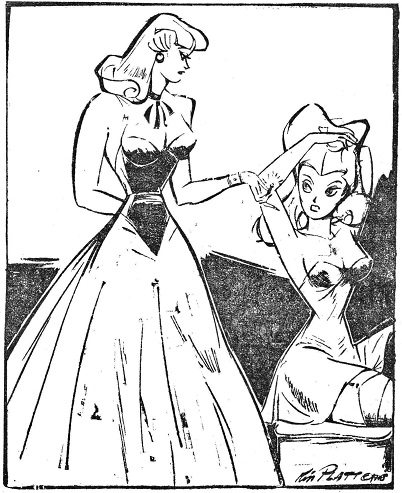 "I just had his ring appraised. Tomorrow I'm having my mind!"
"I just had his ring appraised. Tomorrow I'm having my mind!"
|
The following day, Sept. 4, two ICD C-54s arrived with personnel to complete arrangements for the troop movement. Next day 70 planes landed loaded with Chinese soldiers arrived to begin the operation. A cadre from China wing headquarters with equipment to operate the field was delayed because of bad weather, Col. Blanchard said. As a consequence, the first planes were brought in from the control "tower" in the cockpit of the C-47 parked beside the runway.
Throngs of Spectators
"The attitude of the Jap officers was co-operative," Col. Blanchard said. "However, the enlisted men were only disinterested. There were no incidents of any kind. At the time we set up our operations office we worked at one end of a long counter. At the other end were Nip officers handling the crews of their own airline operations."
'Strips' at Bangkok Confuse C-47 Pilot
Hq., Calcutta - When Lt. Col. C. E. Joyce, CO of 1305 BU, landed his C-47 on one of the earliest flights into Bangkok, Thailand, he almost created an "international" incident.
It seems that, although hostilities were over, the field's strips had been earmarked for different types of traffic - one strip for American traffic and one for Japanese traffic, of which there was still plenty about the field.
Col. Joyce landed on the Japanese air strip where reception was, to say the least, formal. He taxied over to the other strip where the atmosphere was entirely different - in fact, joyous.
On the Jap side of the airfield, a polite request was made that Col. Joyce move to the other side. On the Thailand side, officials immediately offered a "toast" to the entire crew.
HUMP EXPRESS is the official newspaper of the India-China Division, Air Transport Command, APO 192, c/o Postmaster, New York, N.Y., and is published by its Public Relations office. Camp Newspaper Service and Army Newspaper Service features are used, reproduction of which is prohibited without permission of CNS and ANS, 205 East 42nd St., New York, 17, N.Y. Other material is submitted by staff members, ICD-ATC base Public Relations sections and other soldier correspondents. Printed weekly by the Hindusthan Standard, 3 Burman St., Calcutta, India, and distributed each Thursday. Passed by U.S. Press Censor for mailing.
| Military transport schedules over India for cargo, personnel and mail . . . maximum tonnage of essential war materials over the Hump . . . movement of troops and supplies in support of tactical operations in China . . . evacuation of the sick and wounded - these are the missions of ICD-ATC. |

SEPTEMBER 13, 1945
Copyright © 2015 Carl Warren Weidenburner
TOP OF PAGE PRINT THIS PAGE ABOUT THIS PAGE E-MAIL YOUR COMMENTS
PREVIOUS ISSUE HUMP EXPRESS BASE NEXT ISSUE
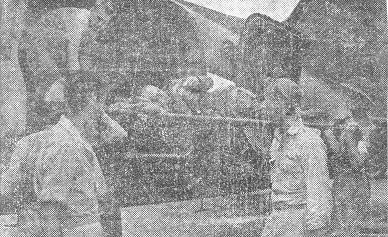 On August 28, planes of the AAF started evacuating British, Australian, Dutch and American POWs from Thailand to Rangoon.
Above, a British litter patient is being removed from an AAF plane after evacuation.
On August 28, planes of the AAF started evacuating British, Australian, Dutch and American POWs from Thailand to Rangoon.
Above, a British litter patient is being removed from an AAF plane after evacuation.
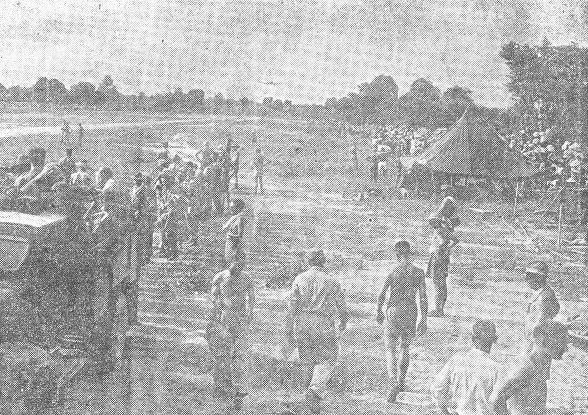 At an Allied-POW-built airfield in Thailand, POWs wait anxiously for the Rangoon shuttle-planes that carry them to their first stop
on the way to home and freedom.
While building this field, under the eye of their Japanese and Korean guards, the prisoners used to joke about Yank planes using it.
Only three Jap planes used the field before it was taken over by the Allies.
Curious Thailanders along the side of the field watch the planes arrive.
At an Allied-POW-built airfield in Thailand, POWs wait anxiously for the Rangoon shuttle-planes that carry them to their first stop
on the way to home and freedom.
While building this field, under the eye of their Japanese and Korean guards, the prisoners used to joke about Yank planes using it.
Only three Jap planes used the field before it was taken over by the Allies.
Curious Thailanders along the side of the field watch the planes arrive.
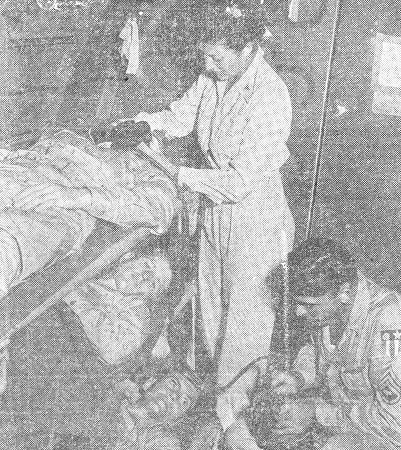 On an ICD plane, carrying Yank POWs from Rangoon to Calcutta, Flight Nurse Jeanne Porche, 803 Air Evacuation squadron, administers
oxygen to PM 3/c Griff L. Douglas, NSN 3566441, 1111 So. Fifth St., Donmar, Tex., as T/3 Rudolph Machatka, medical technician, helps.
Machatka is also of the 803rd.
On the middle litter is ex-POW Pvt. George Ray, 131st F.A., 38036710, Gatesville, Tex.
On the bottom is S 1/c Verie Hobbs, NSN 3214223, son of Mr. and Mrs. L. R. Hobbs, St. Ansgar, Iowa.
On an ICD plane, carrying Yank POWs from Rangoon to Calcutta, Flight Nurse Jeanne Porche, 803 Air Evacuation squadron, administers
oxygen to PM 3/c Griff L. Douglas, NSN 3566441, 1111 So. Fifth St., Donmar, Tex., as T/3 Rudolph Machatka, medical technician, helps.
Machatka is also of the 803rd.
On the middle litter is ex-POW Pvt. George Ray, 131st F.A., 38036710, Gatesville, Tex.
On the bottom is S 1/c Verie Hobbs, NSN 3214223, son of Mr. and Mrs. L. R. Hobbs, St. Ansgar, Iowa.
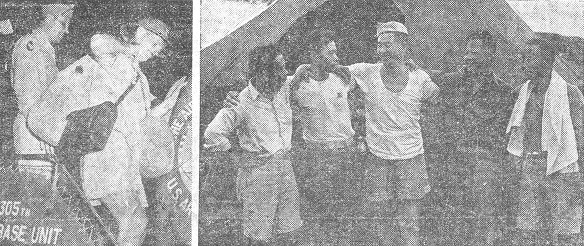 LEFT: One ICD plane full of Yanks from Rangoon arrives at the Dum Dum airbase.
From here they are taken to the 142nd General Hospital.
Capt. R. S. Fralick, 0349541, 132 E. 45th St., New York City, N.Y. is leaving the plane.
LEFT: One ICD plane full of Yanks from Rangoon arrives at the Dum Dum airbase.
From here they are taken to the 142nd General Hospital.
Capt. R. S. Fralick, 0349541, 132 E. 45th St., New York City, N.Y. is leaving the plane.
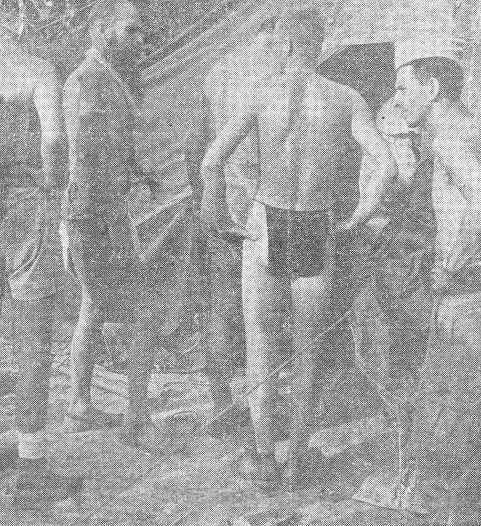 A group of Yank POWs, just in from an outlying jungle labor camp, are given clothes at a Thailand airbase before leaving for Rangoon.
While working on the Moulmein-Bangkok railroad, which took so many lives, most of the men were dressed like the fellow with his back turned -
minus the shoes. The sailor with the long beard is Luke D. Colliton, MM 1/c, NSN 2381950, Jefferson, N.Y.
Charles Oosting, 36152975, Muskegon, Mich. is wearing the loincloth and shoes.
On the right is one of the officers directing the evacuation from Thailand.
A group of Yank POWs, just in from an outlying jungle labor camp, are given clothes at a Thailand airbase before leaving for Rangoon.
While working on the Moulmein-Bangkok railroad, which took so many lives, most of the men were dressed like the fellow with his back turned -
minus the shoes. The sailor with the long beard is Luke D. Colliton, MM 1/c, NSN 2381950, Jefferson, N.Y.
Charles Oosting, 36152975, Muskegon, Mich. is wearing the loincloth and shoes.
On the right is one of the officers directing the evacuation from Thailand.
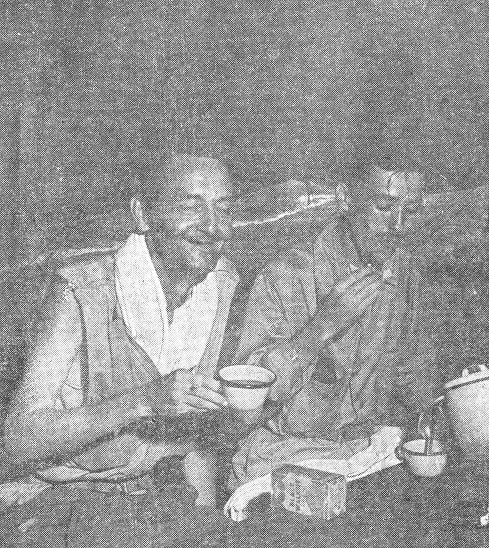 Cpl. P. C. Jones, ASN 20813072, 732 Kayton Ave., San Antonio, Tex., and S/Sgt. John Rogers, ASN 20813071, 1623 Long St., Amarillo, Tex., are really
enjoying their first coffee, white bread and cookies in over three years.
Both men lived through the grueling days of 1943 when POWs built the Moulmein-Bangkok railroad on poor rice, very rare, and poorer stew and jungle weeds.
No wonder they smile happily now.
(All photographs are by S/Sgt. Wesley Ramsey, ICD photographer).
Cpl. P. C. Jones, ASN 20813072, 732 Kayton Ave., San Antonio, Tex., and S/Sgt. John Rogers, ASN 20813071, 1623 Long St., Amarillo, Tex., are really
enjoying their first coffee, white bread and cookies in over three years.
Both men lived through the grueling days of 1943 when POWs built the Moulmein-Bangkok railroad on poor rice, very rare, and poorer stew and jungle weeds.
No wonder they smile happily now.
(All photographs are by S/Sgt. Wesley Ramsey, ICD photographer).
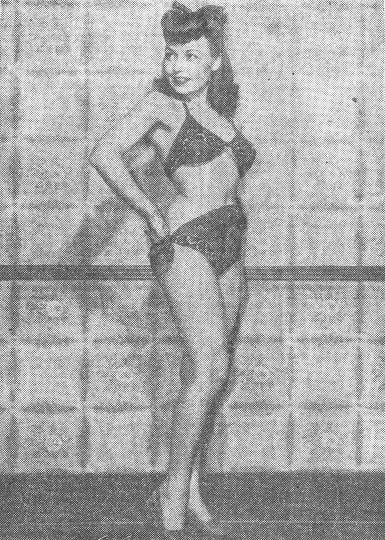 Sorry fellas, but you might as well slow that pant down to a slow chug.
Darleen DeVos, she of the drape-shaped hankie, is married.
As Queens borough representative in the seventh annual "Mrs. America" contest, she competes with hundreds of beauties this month
at Palisades Park, N.J.
Sorry fellas, but you might as well slow that pant down to a slow chug.
Darleen DeVos, she of the drape-shaped hankie, is married.
As Queens borough representative in the seventh annual "Mrs. America" contest, she competes with hundreds of beauties this month
at Palisades Park, N.J.
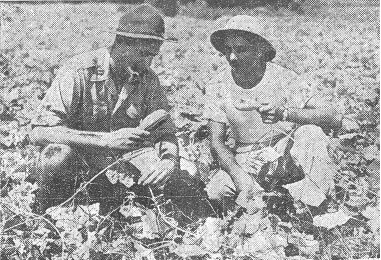 A bonus for the Kurmitola mess hall is paid off in the 1345 BU garden where ex-California farmers, Capt. George Bowman (left) and
Sgt. Andrew Testa examine the bumper crop.
Cpl. Adolph Testa, Andrew's brother, is the third member of the farmer team from the Golden state.
A bonus for the Kurmitola mess hall is paid off in the 1345 BU garden where ex-California farmers, Capt. George Bowman (left) and
Sgt. Andrew Testa examine the bumper crop.
Cpl. Adolph Testa, Andrew's brother, is the third member of the farmer team from the Golden state.